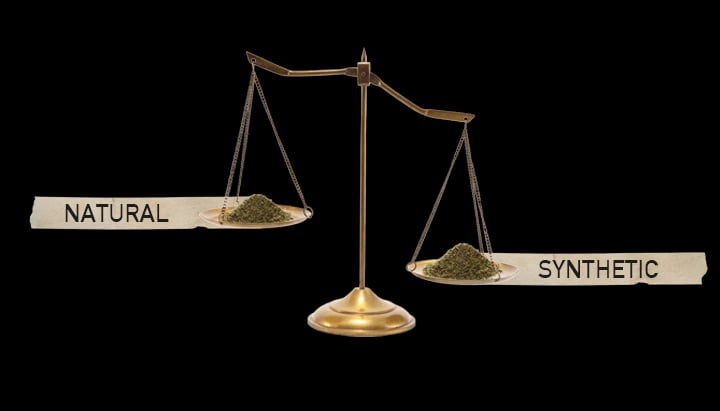.

Synthetic Cannabinoids: The Dangers of K2 and Spice
The dangers of using synthetic cannabinoids like K2 and Spice are known to many—but just how threatening are these substances, really? It turns out, very. Follow along as we detail the health risks associated with unregulated synthetic cannabinoids, as well as some viable uses for clinically approved forms of synthetic THC.
The cannabis plant and its constituents have repeatedly been shown to demonstrate low toxicity. Unfortunately, this is far from the case with many synthetic cannabinoids. These lab-designed compounds have made their way into the recreational market, where they pose some very serious risks to consumers.
For the sake of your health, continue reading to find out what synthetic cannabinoids are, and why (in almost all cases) you should avoid using them.
Contents:
Understanding Synthetic Cannabinoids
Perhaps you’ve heard of synthetic cannabinoids (SCs) like “Spice” or “K2” from your friends, or maybe you’ve even used them yourself. In that case, we’d recommend ceasing the use of these substances immediately, as they are much more menacing than they may appear.


What Are Synthetic Cannabinoids?
At their core, synthetic cannabinoids are simply cannabinoids created in a lab environment. Historically, most synthetic cannabinoids are created to mimic one compound in particular—THC. There are several reasons one might purchase and use synthetic cannabinoids:
- Legal high: As many forms of synthetic THC are structurally distinct from the natural cannabinoid, it’s often possible for manufacturers to sell these products in areas where cannabis is not legal by exploiting legal loopholes[1], or even labelling products as not intended for consumption. For example, certain forms of synthetic marijuana (like K2 weed) are marketed as incense.
- To pass a drug test: Given that synthetic cannabinoids tend to have a distinct chemical structure from natural THC, some individuals may choose the former in order to pass a drug test.
- By accident: The unfortunate reality is that synthetic cannabinoids also make their way into/onto natural cannabis flower and plant material. Shady producers will sometimes adulterate a poor-quality product with synthetic THC, which can have serious implications.
But when did this all begin? Although synthetic cannabinoids have been around in some form for decades, it was in 2008 that German pharmaceutical companies detected a substance known as JWH-018 in at least three versions of Spice—one of the first synthetic cannabinoid products.
Upon banning the substance, German Spice producers simply altered the alkyl chain of JWH-018 in order to keep selling their product without technically breaking the law. The problem is, JWH-018 isn’t just a synthetic version of THC. Unlike THC, it is a full agonist of CB1 and CB2 receptors. In fact, it has been shown to exhibit five times the affinity for CB1 receptors as natural THC, causing intense effects that come with some grave risks.
To give you an idea of just how grave, JWH-018 and other synthetic cannabinoids are associated with numerous deaths. Indeed, in 2011, a South Carolina college student’s death was attributed to JWH-018, while Aaron Josef Hernandez, an NFL player, committed suicide shortly after using K2 in prison. Inmates reported he "was not himself" after using the drug, in the run up to his death.
.jpg)
.jpg)
How Synthetic Cannabinoids Are Used in Research
Now, as threatening as these substances can be, there are some instances in which synthetic cannabinoids have legitimate purposes. Namely, in research projects and clinical applications.
While many researchers would rather work with natural cannabis in their preclinical and clinical studies, the strict scheduling of cannabis makes it very difficult to legally acquire natural plant material. Therefore, researchers are left to use synthetic cannabinoids in order to study the workings of the endocannabinoid system and other physiological systems. While these synthetic compounds present their own issues, including excessive side effects in some cases, they at least allow researchers to get closer to understanding the therapeutic potential, and health risks, of cannabinoids.
In some cases, SCs have legitimate medical applications. For example, dronabinol is an approved form of synthetic THC that is prescribed to people with chemotherapy-induced nausea and vomiting, and HIV/AIDS-induced anorexia. Though not without its drawbacks, this form of synthetic THC has been shown to demonstrate good therapeutic efficacy and relatively mild adverse effects. Originally created in the mid-1980s, dronabinol inadvertently set the stage for the creation of other novel synthetic cannabinoids, including those like Spice and K2.
Synthetic Cannabinoids: A Growing Cause for Concern
In both Europe and the United States, synthetic cannabinoids have become a major public health issue, with 209 substances[2] detected through the EU Early Warning System from 2008–2020. Since the mid-aughts, these substances have found their way into prisons, been used to adulterate other products, or been mislabelled as other products. During this time, SCs have been found to be toxic, especially in high doses, and have caused mass poisonings in Europe, Russia, Canada, and the US.
The threat to health and safety caused by natural cannabis is nowhere near as severe as that caused by synthetic cannabinoids. In mild cases, synthetic THC can cause intense, uncomfortable effects such as confusion, elevated heart rate, and vomiting, while more severe cases can see people experience psychosis, suicidal ideations, and even death.
In some instances, adulterants like rat poison[3], aka brodifacoum, have even been found in synthetic cannabinoids, leading to “unexplained bruising, coughing up blood, bleeding from the nose and gums…” and death.
The Legal Status of Synthetic Cannabinoids
Until 2016, when the Psychoactive Substances Act was passed, synthetic cannabinoids could be bought legally at head shops in the UK. Now, the legality of SCs is very nebulous, and varies across the EU and UK. In the latter, synthetic cannabinoids like Spice and K2 are deemed Class B drugs, meaning users and producers can be fined or jailed, to different degrees. However, as many producers change the chemical structure of these substances, they may be able to circumvent some of these repercussions.
In various parts of the EU, including France, Ireland, Sweden, Poland, and Germany, many forms of synthetic cannabis have been illegal since the late 2000s. However, today, the laws surrounding synthetic cannabinoids vary year by year, and by country, as many new substances are created all the time. For instance, in Germany, around 80–90% of synthetic cannabinoids are banned, with the remaining 10–20% representing chemical structures not covered by these laws. Meanwhile, in Spain, Spice and other synthetic cannabinoids are unregulated, and can legally be bought, sold, and shipped.
Ultimately, as there are always new synthetic cannabinoids being created, the legal landscape surrounding these substances is murky and subject to change.


Dangers of Synthetic Cannabinoids
Though we’ve addressed some of the dangers of using synthetic cannabinoids, below we will review them in greater detail. As mentioned, synthetic forms of THC act as full agonists of CB1 and CB2, whereas natural THC is a partial agonist. While to the uniformed this may not seem like a big deal, this increased binding affinity has a massive impact on the magnitude of effects and safety of these substances.
Memory Impairment
In a 2020 research article[4], researchers found repeated use of synthetic cannabinoids to be “associated with impairment in executive functions and emotional processing”. They go on to note that these cognitive impairments are associated with depression and “schizotypal traits and symptoms” (e.g. paranoid thoughts, unusual perceptions, etc.). Ultimately, the study authors conclude that this evidence adds to the existing data surrounding the long-term adverse effects of synthetic cannabinoids on mental health.
Breathing Difficulties and Lung Inflammation
Among other studies, a piece of research[5] published in 2017 found synthetic cannabinoids to cause respiratory depression, even in people without an underlying pulmonary disease. As such, the study authors recommend that clinicians have a “high index of suspicion” regarding the use of these substances, especially in individuals with a history of drug overdose.
Moreover, studies on mice[6] have shown SCs to potentially cause lung inflammation through their interaction with CB1 receptors, which the study authors suggest may call into question the use of CB1 antagonists for dealing with SC-induced lung inflammation.
Extreme Anxiety and Psychosis
In addition to cognitive impairments, individuals who use synthetic weed are more likely to experience paranoia and anxiety[7]—and this is especially true for those with existing mental health conditions.
Moreover, both vulnerable and healthy individuals[8] have been found to experience severe psychotic symptoms[9] following use of SCs, which have been shown to last for weeks in some circumstances.
Suicidal Ideation
Similarly, instances of suicidal ideation[10] and self-harm appear to increase among both vulnerable and healthy individuals who use synthetic cannabinoids. While the full implications of this are unclear, the potential increase in psychotic symptoms associated with SCs could contribute to such instances.


Chest Pain and Tachycardia
SCs may also cause elevated heart rate, aka tachycardia, as well as chest pain. One 2021 research article[11] found the two greatest sympathetic nervous system cardiovascular effects of SCs to be tachycardia and hypertension. Though tachycardia is not always cause for concern, in some instances it can cause fainting, heart failure, or death.
Gastrointestinal Issues
There is also evidence to suggest an association between synthetic cannabinoid use and GI issues. A 2021 research article[12] found SCs to be capable of causing everything from abdominal pain and vomiting to intestinal ischemia.
Death
Finally, as we’ve referenced above, there have been numerous reports of deaths directly associated with synthetic cannabinoid exposure, with 165 deaths reported[13] in the UK from 2012 to 2019. The majority of these deaths were attributed to acute use, though cardiorespiratory complications appeared to play a part in 13.4% of the reported cases.
This is in sharp comparison to natural cannabis, which is associated with essentially no deaths. While there is some debate over this, the risk of death due to cannabis toxicity alone is negligible[14].
Synthetic Cannabinoids: Not Worth the Risk
As we’ve made evident throughout this article, the risks of synthetic cannabinoids far outweigh the potential benefit of getting high. Aside from their use in very specific clinical settings, these designer cannabinoids are simply not worth experimenting with. Whether you have any preexisting health conditions or not, SCs appear to be able to cause or exacerbate all sorts of conditions and symptoms. Even if you find legal versions of Spice, K2, or other SCs, leave them be.
It’s better to take the time to grow your own weed from seed than it is to put your health at risk by using something promising a “legal high”. Be wise, and always do your due diligence before taking any psychoactive substance.
- Hijacking of Basic Research: The Case of Synthetic Cannabinoids - PMC https://www.ncbi.nlm.nih.gov
- New report highlights public health and social risks posed by synthetic cannabinoids in Europe | www.emcdda.europa.eu https://www.emcdda.europa.eu
- The Spice of Death: The Science behind Tainted 'Synthetic Marijuana' | Scientific American https://www.scientificamerican.com
- Frontiers | Chronic Use of Synthetic Cannabinoids Is Associated With Impairment in Working Memory and Mental Flexibility https://www.frontiersin.org
- Synthetic cannabinoid induced acute respiratory depression: Case series and literature review - PMC https://www.ncbi.nlm.nih.gov
- Synthetic cannabinoids induce acute lung inflammation via cannabinoid receptor 1 activation | European Respiratory Society https://openres.ersjournals.com
- Synthetic cannabinoids (Spice) | NHS inform https://www.nhsinform.scot
- https://www.sciencedirect.com/science/article/abs/pii/S0006322316000834
- Frontiers | Synthetic and Non-synthetic Cannabinoid Drugs and Their Adverse Effects-A Review From Public Health Prospective https://www.frontiersin.org
- Suicidal ideation and self-harm following K2 use - PubMed https://pubmed.ncbi.nlm.nih.gov
- Assessing and Addressing Synthetic Cannabinoids and Cathinones in Neuropsychiatric Toxicological Emergencies https://www.psychiatrictimes.com
- Gastrointestinal manifestations of synthetic cannabinoids: a retrospective cohort study | BMC Gastroenterology | Full Text https://bmcgastroenterol.biomedcentral.com
- Synthetic Cannabinoid-Related Deaths in England, 2012-2019 - PubMed https://pubmed.ncbi.nlm.nih.gov
- https://journals.sagepub.com/doi/10.1177/02698811221115760

































